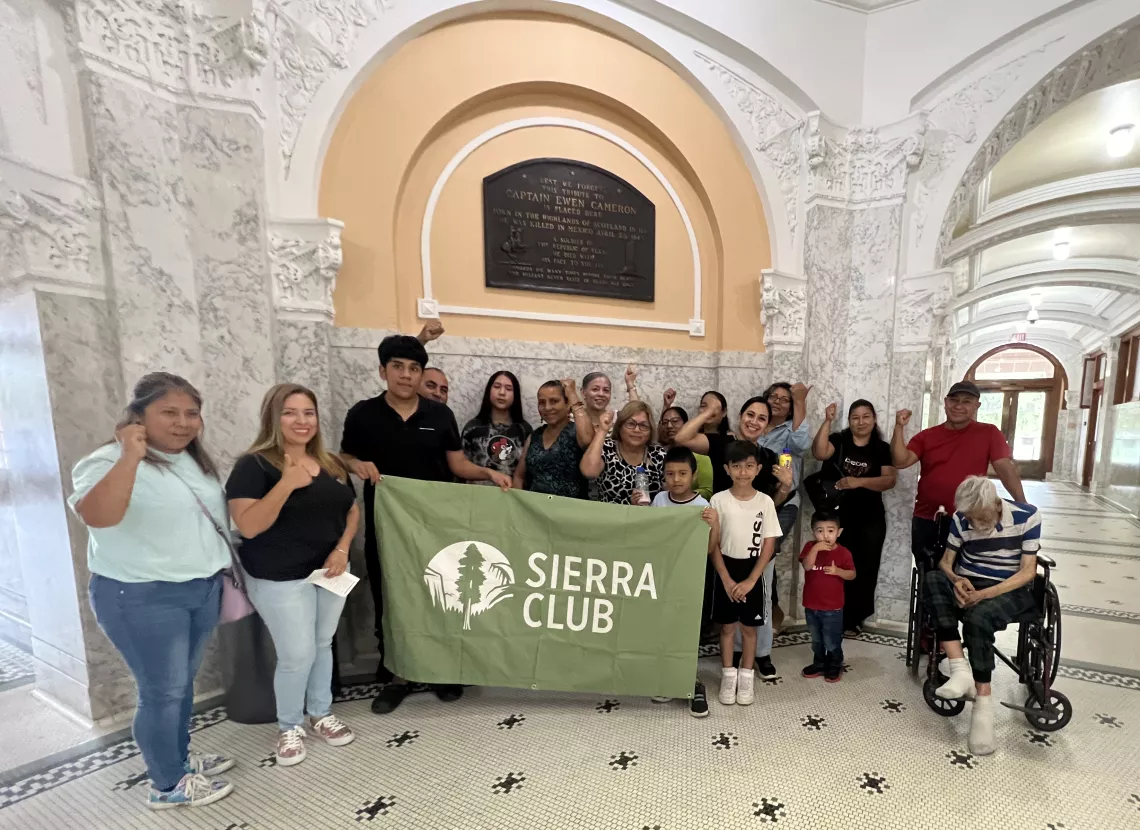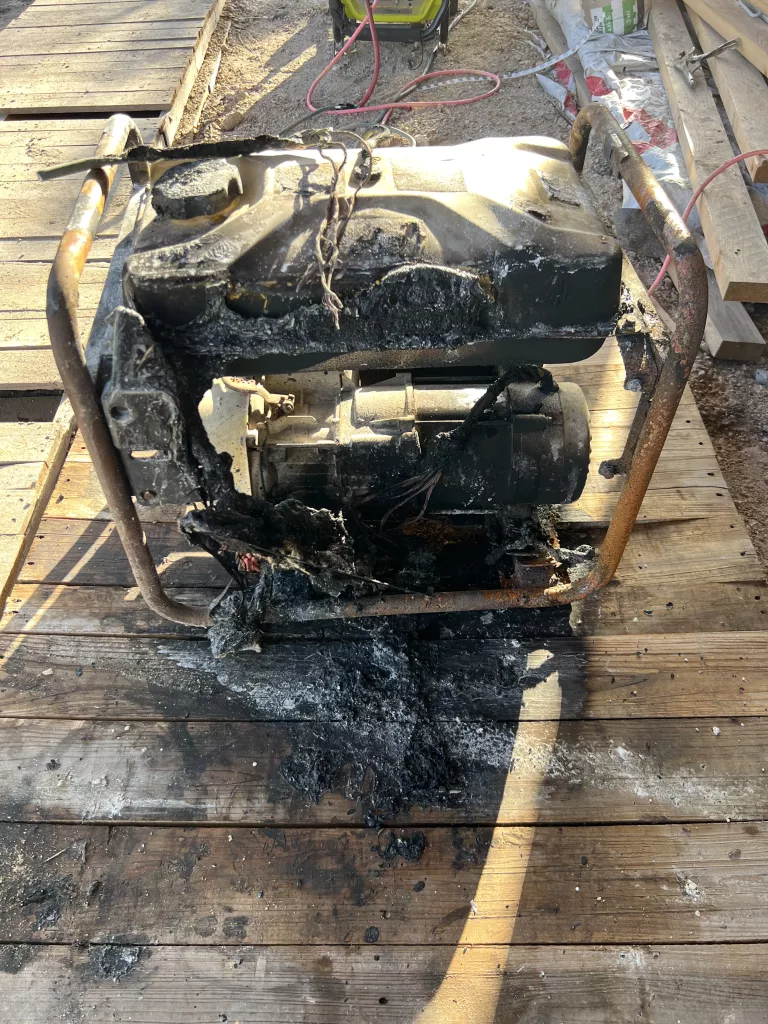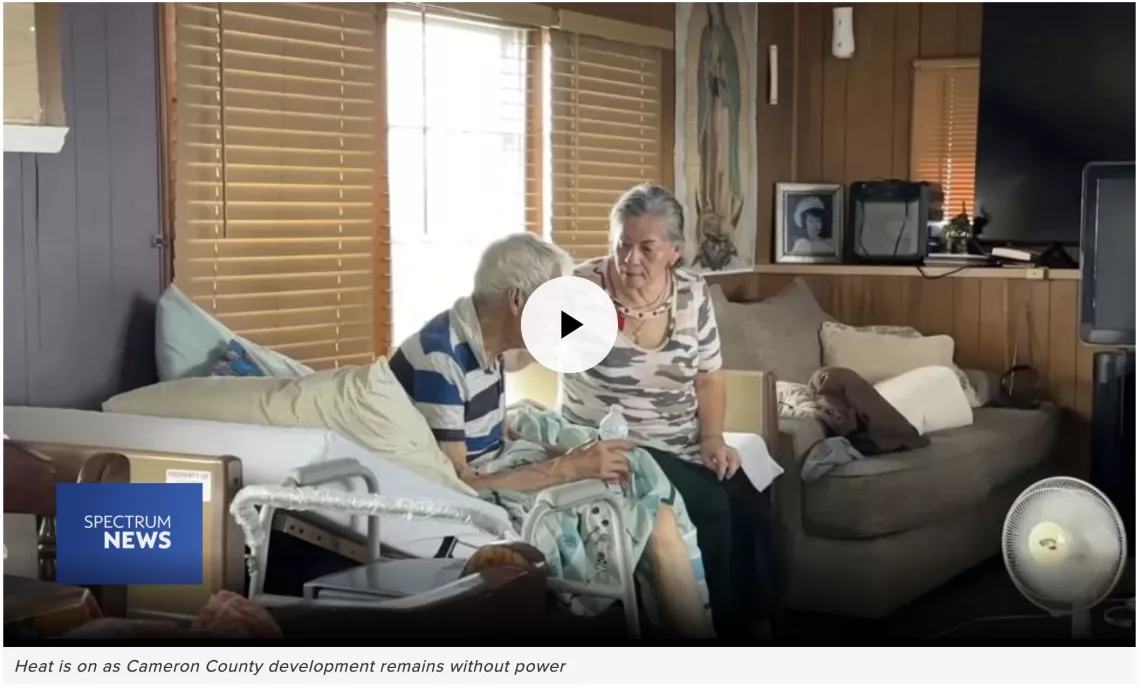
Residents of Hacienda West at the Cameron County Commissioners Court.
By Agripina Gomez, Rio Grande Valley Clean Energy Organizer
When we think of a just transition to clean energy, we often assume it will involve everyone in the communities we serve. In the Rio Grande Valley, just five minutes from the Texas-Mexico border, where the Rio Grande River divides two neighboring countries, it's not the case. In fact, we are decades behind on infrastructure that contributes to the quality of life and overall safety and health of a community. In colonia Hacienda West, Brownsville, Texas (an unincorporated neighborhood in Cameron County), families have been living without electricity for over one year. Yes, that's right, no electricity – a basic need that most of us take for granted. This is the real story of families living in the Rio Grande Valley and how lack of accountability from those in power, capitalism, energy poverty and burden has impacted their wellbeing. More than that, it is a testimony to perseverance -- how organizing and supporting one another gets us real wins.
Imagine you buy a property, and you are promised great things about this land: amenities and a great location. You take the right steps with the county government, get all your permits, and spend money on technicians to be connected to utilities. However, when you move in with your family and are ready to be connected to electricity, you find out there is no way you can get electricity because there are no services in that area. That is exactly what happened to families in colonia Hacienda West.
With nowhere to turn to after questions to elected officials and the developer went unanswered, the families of Hacienda West were left hopeless. They had to continue to live and thrive, and as a solution families have used gasoline-powered generators to be able to keep the lights running for a while, cool their homes for brief periods of time during the hottest parts of the day, and save their food from spoiling. Gasoline costs money, and if you’ve ever used a home generator, you know they consume a lot of fuel. Families have struggled with these costs, which often add up to more than the average electricity bill you and I pay. Generators also expose their loved ones to the toxic fumes they release, like carbon monoxide. One generator exploded at dawn and almost burned down a home with a 90-year-old grandpa inside. One thing about the Valley is that neighbors support each other like a familia and donated a new generator for that family.

The charred remains of a home generator that exploded.
Back in April we learned about this injustice the families were facing at a recent Department of Energy Road to Energy Justice event in the Rio Grande Valley. At the event, which focused on bringing clean energy to poor and working class families on the border, it became clear that despite many efforts at the federal level, all levels of government (including our regional electricity providers and utilities) were leaving many residents behind.

Like the luchistas and poderosos (fighters and powerful) that we are, we decided to organize with the families and find a solution and bring them justice. First we started gathering, having meetings and putting together the pieces to the puzzle. We went to county commissioner meetings and spoke out about the issue. We reached out to the media. We asked the developer to fix the issue and pay the electric utility American Electric Power (AEP) to start working on the infrastructure, but he did not want to help and said that was not his responsibility, that it was AEP’s. He thought it was unfair to pay for infrastructure that was going to give AEP a customer for life, meanwhile the families were still making their monthly payments to his real estate company for the land they purchased from him.
The families were afraid to speak up, because they feared retaliation and getting their land taken away. Cameron County officials said the developer had taken the right steps when developing the subdivision and he had not broken the laws set to provide residents of new communities essential utility services, also known as model subdivision rules. Families went months with no accountability and no services.
They lived in triple digit temperatures in the record hot summer of 2023 with no air conditioning to cool their homes and keep their loved ones safe. Food spoiled, and they relied on ice chests to store what food they could. During the school year their children could not complete their homework at home because it was dark, and some were falling behind academically.
However, we pushed through – meeting after meeting, public comments, support from the office of Senator Morgan Lamantia, calls to the developer – and after so much pressure and organizing, the reluctant developer finally paid AEP over $100,000 to start working on the infrastructure. This allowed AEP and the community to move forward with necessary paperwork and plans to bring transmission lines and transformers into the community.
The working trucks started arriving in the neighborhood and everyone was so excited! The joy in the children's faces and their relieved momma knowing they will soon have a dignified home with electricity to live. This battle is won, and now families will have electricity by the end of the year. But the larger struggle continues.
This is what organizing does: bring power to the people and hold the system accountable.
Although the families from Hacienda West will not have clean energy, they will have access to power: the power to turn on their lights and care for their families, and the power to organize for justice. They will no longer be breathing toxic carbon monoxide from generators. Their children will be able to complete their homework at home. They will be able to eat a home-cooked meal with safe, fresh food. They will not be spending their hard-earned dollars on gallons of gas to keep the generators running. And in this upcoming winter, they will be able to keep their homes warm.
Our team will continue supporting the families of Hacienda West to ensure they have the best tools and information to make electricity choices that best serve their needs for a clean and livable environment.
That is why we fight and organize, because we believe having access to electricity is a human right, that Texas families deserve better, and that no family should be left in the shadows. Special thanks to the office of Texas State Senator Morgan Lamantia, Ruben O’Bell, and Rosalba Guzman for your outstanding leadership and service to your community.
Please support the cause and join our organizing efforts while we fight for social and environmental justice, hasta la victoria, siempre!
-Agripina, organizadora comunitaria